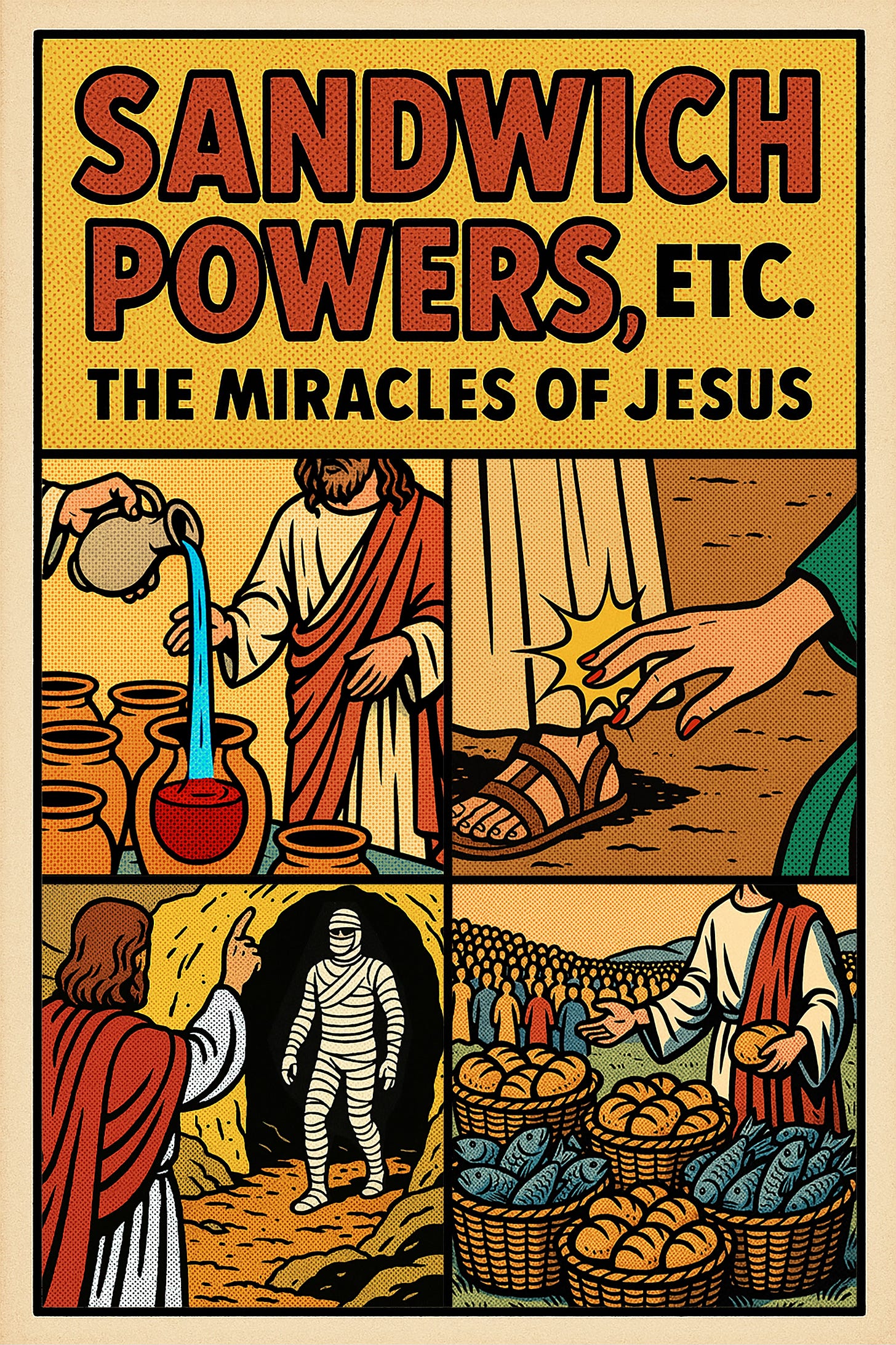Mark 8.22-26
During the first year of his captivity in a Nazi prison, the theologian Dietrich Bonhoeffer wrote a number of works of fiction, including a novella entitled “Sunday.” In the story one of Bonhoeffer’s characters grouses about the miserable sermon she had heard that Sunday morning. The scripture for the sermon was the Gospel’s account of Jesus performing a miracle on the Sabbath.
About the preacher and his preaching, she gripes:
“He wanted to preach about plucking the ears of corn on the Sabbath and about the verse, “The Son of Man is lord of the sabbath.” Instead of saying that Christ may do things because he is Christ but that doesn’t give us the right to do them by any means, and that if Christ keeps the Sabbath by breaking it, then we first have to learn how to keep the Sabbath holy in earnest, by keeping it—instead of saying that, he babbled on about the freedom of all human beings, and that people may do whatever they think is right, and that we should spend Sunday out in nature rather than in church, and that it doesn’t matter so much at all because the dear Lord is so kind and sweet and good that he isn’t even capable of wrath. My dear Frau Direktor, did it escape you again that the pastor said what you wanted to hear; but didn’t preach the word of God?”
Christ may do these things because he is Christ.
In other words, it is not enough simply to read the scriptures; it is how we read the scriptures that matters. It t is not enough to believe in God. You have to know God; that is, you have to know God rightly. After all, it is possible to believe fervently but believe unfaithfully. It is possible to have sincere faith but sincerely trust a lie. Consequently, it is possible to have hope (or even expectations) for God to perform a work in your life that God will never do because that is not the God he is!
It is not enough to believe in God. You have to know God— as he truly is and does. And this is especially critical when it comes to the miracle stories in the Gospels because, like the devil quoting scripture in the desert, nothing tempts us into false faith and frustrated despair, nothing lures us into misunderstandings of God and misapprehensions of his promises, nothing makes us more susceptible to idolatry— nothing makes us more prone to what we want to hear rather than what God speaks to us— than miracle stories.
Miracle stories can be dangerous.
Rowan Williams is likely this century's most significant theologian. Twenty-four years ago, while he was leading the worldwide Anglican Communion as the Archbishop of Canterbury, Williams visited Holy Trinity, Wall Street in New York City. Spiritual directors from across the nation had invited Williams to offer an address on “the shape of the holy life” at 74 Trinity Place on the morning of September 11, 2001. Holy Trinity Episcopal Church is less than a hundred yards from Ground Zero.
Rowan Williams and his audience had gathered for his lecture on the twenty-second floor of the Trinity Institute when a plane struck the World Trade Center’s north tower just after nine in the morning. The theologian’s host, Reverend Fred Burnham, sprang to his feet and cried out, “Some cowboy has just cracked through the sound barrier!”
They could not see fully what had happened.
But then a scream followed. A secretary working on the same floor had seen what had happened. When the second plane struck struck the second tower, their murmurings of an accident turned to panic over an attack. “Suddenly we could see things clearly,” Reverend Burnham later recalled, “We knew we were in the middle of a war zone and this was not a happy day.”
Maintaining his composure, Archbishop Williams led the frantic gathering in prayer, gently lifting up to God the specific anxieties of each individual in the room. After he prayed, he found blankets in the church nursery, which they tore into strips and moistened with water to serve as impromptu face masks against the increasingly suffocating air. “The air is even worse outside,” Reverend Burnham remembered thinking, “I don’t know how much longer we can tolerate this, maybe we’ve got fifteen minutes.” Just then, Elizabeth Koenig, a professor at New York’s General Theological Seminary, laid her hand on Rowan William’s shoulder and said, “I can’t think of anyone I’d rather die with.”
Deciding they faced better odds outside the church building, Archbishop Williams led them through the elephantine cloud of smoke— he even went back for a woman on Holy Trinity’s staff who was paralyzed by fright. He put his arm around her and carried her through the dark fiery plumes. When they reached the Staten Island ferry terminal, a construction worker— an evangelical with a strong faith— decided that the huddled mass of survivors all needed to turn to the LORD whose judgment and wrath had certainly been visited upon the city. Convinced the terrorist attacks were the judgment of God, the construction worker led the group of survivors in prayer.
It is possible to believe fervently but believe unfaithfully. It is possible to read the scriptures but not read the scriptures rightly. And it is possible to pray to god yet not address him whom Jesus calls Father.
At the end of the afternoon on the eleventh, Rowan Williams returned to his hotel room to work on a brief article for the journal Church Times. “My mind shies away from the slaughter,” he wrote, “I’m obviously very glad to be alive, but I also feel deeply uncomfortable with the word I’ve heard invoked over those of us who survived, miracle.”
A decade ago, after a long, arduous year of emergency surgeries and kitchen sink chemotherapy that nearly killed me, my oncologist handed me a copy of my most recent bloodwork and my latest PET scan.
“Clear as a bell, my friend,” he said and, laying his hand on my shoulder, added, “You’ve made it through the fire.”
And for a brief moment, I heard his words— I received them— as a miracle. But no sooner had he laid his hand on my shoulder than I heard an anguished cry erupt in the exam room across the hallway from mine. The peal of shock was followed by a sob too deep for words. It came from the young mother I had gotten to know in the infusion lab over the previous weeks and months. I think her name was Jennifer. As a pastor, I recognized the faulty-ripcord sound of her disbelieving grief. It was the noise that almost always follows the news that there is nothing more that medicine can do.
When I arrived home that afternoon, I discovered a sympathy card in the mail. A clergy colleague’s name greeted me on the upper left corner of the envelope. Inside, on the front cover, a spare, pen-and-ink drawing illustrated an IV bag hanging on a wheeled stand. Its tube was connected to a woman, depicted from the rear, who was kneeling on a tiled floor in front of a toilet. Jesus, wearing a crown of thorns, held the woman’s hair away from her face as she leaned over to puke.
I opened the card.
Above the messy signature were four black words whose script matched the artwork, “God is in control.”
According to Mark the Evangelist, they thought they knew exactly who Jesus is and what he does. As soon as Jesus and the twelve come to the town of Bethsaida, they not only bring to Jesus a blind man they provide the prescription.
They tell Jesus, “Go on— touch him."
They believe Jesus is useful.
And who can blame them. St. Luke reports that the residents of Bethsaida had witnessed Mary’s boy and Pilate’s victim “perform mighty works.” Jesus fed over five thousand with merely a meager amount of bread and fish in the region of Bethsaida. When Jesus walked on water in the fourth watch of the night, it was on the way to Bethsaida. They have seen what the Son can do. Having seen him work, they assume they know who he is and how he can be useful to them. So they bring their blind friend to Jesus and they tell the LORD what to do.
“Touch him, Jesus. And he will be healed.”
Take note of how Jesus responds to Bethsaida’s impudence.
Mark writes that Jesus removes him from their care, clasping the blind man’s hand in his own and taking the blind man all the way out of the city. Once they are no longer in Bethsaida, Jesus spits in the blind man’s eyes. Then Jesus lays his hands on the man. And as though he’s not sure of his own effectiveness, Jesus asks the blind man, “Do you see anything?”
His eyes still wet with spittle, the blind man shakes his head.
“I see men, as trees, walking.”
He is neither blind nor seeing.
Does Jesus fail? Or is he deliberately ineffective? When Jesus came to the city of Nain, all he had to do was touch a boy’s funeral bier and— presto— the mother’s dead son was restored to life. All the bleeding woman in Capernaum needed to do was touch Jesus’s jacket incognito and immediately she was healed. Jesus managed a long-distance healing for the centurion’s child. When Jesus encounters a man born blind, he mixes his spit on the ground and he applies it to the blind man’s eyes. And he does not require a do-over.
Jesus is the humanity of God. If he so elected, Jesus could have healed this blind Bethsaidan in an instant, with a thought as much as with a touch. But Jesus does not immediately remedy the man’s suffering. And notice, the blind man recognizes trees. He knows what trees look like. He was not born blind; he was blinded. Still, Jesus does not alleviate his affliction forthwith.
As David Martyn Lloyd-Jones preached on this passage:
“Here the LORD acted with great deliberation. Jesus always had a reason for varying his technique. In other words, all our LORD’s miracles are more than events; they are parables. This is especially true of this one. He healed the blind man the way he did to proclaim a word about himself. Indeed it is a terrible message.”
Back to Bonhoeffer’s question, “Who is this?”
A God who does not immediately heal suffering upon request.
The morning after the attacks Rowan Williams was walking from his hotel at seven in the morning to deliver a lecture at St. John the Divine Cathedral. Crossing the city street, an airline pilot walked up to the collared archbishop and exclaimed in exasperation, “Where the hell was God?”
Calmly— soberly, the theologian replied with what was surely heard as a terrible message, “God is not useful.”
I have no doubt the artist who created it was sincere in their belief, but in order to speak Christian, the sympathy card I received should not have said, “God is in control.” Because that is not the God Jesus calls Father.
Christians do not believe that God is in control.
Christians believe God is sovereign.
And those are not equivalent assertions. To say God is sovereign is not to say that God is in control. For God to be in control, God would have to act in such a way that would make creatures other than the free creatures God has made. Control takes your creaturely freedom away from you and takes God's freedom and forces it on to you. If God is in control, then you do what he wills, not what you will. In which case, God himself may as well have flown the planes into the Twin Towers.
God is not in control.
God is sovereign.
So much of our anger at God, so much of our frustration with faith, so much of our impatience with life is based on a misunderstanding of who God is and what his promises actually are.
I begged you, but you did not take this illness from me. Why God?!
The anger and the frustration and the impatience is rooted in disappointment. But the disappointment is due to bad expectations. The Father does not run creation like a television producer, watching us on a screen and pushing— or not pushing— buttons. The Holy Spirit is not like Superman, swooshing into our lives if we but cry out with sufficient volume.
God is not in control.
When we profess that God is sovereign, we mean that while God does indeed act in this time, until the End of everything God never does everything God can do. God acts in the world— yes, but until the End God never acts fully. This is the straightforward teaching of the scriptures, “Now we see through a glass darkly, but then face to face.” The apostle Paul means that God’s work in the world is no more clear to us than the men who appeared as trees to the blind Bethsaidan.
We’re all still in the middle of what Jesus is working!
According to Paul, in everything that happens in this world, to everybody everywhere, God is active but God is not yet doing everything God can do. God has acted and is acting, but there is still more for God to do that has not yet been done, and we are living between what God has done, is doing, and what God is yet to do.
“Now we see through a glass darkly, in the future we will see face to face.”
But we did see face to face.
We did see Jesus.
In other words, Paul is saying that God has not been God fully yet— except in Jesus Christ. The only place we have seen God do everything God can do is in Jesus.
This just is what makes us Christians.
As my friend Chris Green puts it:
“What makes us Christians is that we look at Jesus and say “When our God does everything God can do, it looks like that. It looks like a man who is born miraculously and brings life and hope and joy and peace and comfort to everybody who's around him, who speaks truth, who corrects the wrongs that he sees, who saves that woman from being stoned, who raises that child from the dead, who even when he dies, passes out of death into a whole new life. Because when God does everything God can do, it looks like Jesus' relationship to God.””
God is not in control.
God is not responsible for every heartache and tragedy in your life. God is not the author of the evils you have suffered. God does not punish you in order to teach you a lesson. God did not give me a miracle but deny one for the mother across the hallway from me. Such a god would be a devil.
God is not in control.
God is sovereign.
And what it means to have faith is that you trust that when God is through being God— when God is finally fully God— every wrong will be put right and every sad thing will come untrue.
That is our hope.
That is the promise of the gospel.
That and nothing less.
In the meantime, like the man who sees his neighbors as trees, we are all waiting on God to finish what he started. And faith looks like this half-blind man who does not walk away from Jesus when Jesus does not immediately work in the way he wanted. Faith sticks with Jesus even in his half-finished work.
No wonder Bonhoeffer says we prefer to search the scriptures for what we want to hear rather than the word of God. Is David Lloyd-Jones not correct to call this “a terrible message?” Why must we wait in God’s unfinished work? Why must we pray prayers that seem to go unanswered? Why must you not get the “miracle” another receives?
Why must we suffer?
Notice.
When Jesus and the disciples arrive in Bethsaida and the blind man’s friends bring him to them for healing, Jesus purposively takes the blind man by the hand to lead him out of the town and away from their ability to witness his work. The relocation from Bethsaida is a rebuke of Bethsaida.
Why?
Jesus supplies the answer in his blistering judgment sermon in the Gospel of Luke:
“Woe to you, Bethsaida! For if the mighty works done in you had been done in Tyre and Sidon, they would have repented long ago, sitting in sackcloth and ashes. But it will be more bearable in the judgment for Tyre and Sidon than for you…You shall be brought down to Hades.”
Sodom will have a better day in the LORD’s courtroom than Bethsaida, Jesus hollers. In other words, more than any other place, Bethsaida has seen Jesus perform miracle after miracle. But the miracles have not changed them! They saw Jesus transform loaves and fish into a feast for five thousand, but witnessing the miracle did not transform them.
Miracles have not changed their character.
The miraculous has not made them any holier.
Christ’s miracles have not made them more Christ-like.
Dietrich Bonhoeffer wrote his novella “Sunday” for his fiancé, Maria von Wedemeyer. Around the same time that he started writing “Sunday,” he wrote a letter addressed both to Maria and to his best friend Eberhard Bethge. At that point, Bonhoeffer had been Hitler’s personal prisoner for about three months, and the occasion of his letter is his realization that his captivity could end in martyrdom and that he very well may never see his fiancé or his friend again.
Despite this grim awareness, Bonhoeffer makes a surprising comment, writing to the two of them, “There is nothing that can replace the absence of someone dear to us. And one should not even attempt to do so. One must simply hold out and endure the suffering. At first, that sounds very hard, but at the same time, it is also a great comfort.”
The suffering of such absence is also a great comfort because it is how Christ takes on greater presence in us.
Just as Jesus is deliberate in how he goes about healing the blind man from Bethsaida, God has a purpose in not being fully God yet.
To the church at Rome Paul makes the astonishing claim that he rejoices in his sufferings. To the Philippians Paul puts an even sharper edge to it, saying, “You have been graced to suffer.” That is— strangely— suffering is a gift. In fact, throughout the New Testament there is this terrible message that Almighty God can do anything; and yet, suffering is at the very heart of the life of faith. So much so, Paul summarizes the Christian life as “present suffering.”
It is possible to have strong and sincere faith but strongly, sincerely trust a lie. Here is the truth. God is not going to save you from suffering. Because God is saving you in suffering. Suffering is the site of your sanctification. Suffering is how salvation takes place. Paul’s proclamation to the Romans continues, “We boast in our sufferings, knowing that suffering produces endurance, and endurance produces character, and character produces hope and hope does not put us to shame for that is how the love of God is poured into our hearts.”
Thus—
Any promise of the gospel, any form of the faith, any version of Christianity that does not train you in patience is not true.
Hear me.
I would not be here if God did not at times intervene in our lives. I certainly would not have been called to preach and I probably would not have lived past this Christmas. I am not saying that God never works miracles. I am saying that if that’s what you expect, all the time, you will never suffer. And if you never suffer, you will never learn patience. And if you never learn endurance, you will never grow into the likeness of Christ. The only way in which Christ's character is going to be formed in you, in me, is as the LORD lets us live in the midst of endurance. There is no other way for his character to be instilled in us. God does give sight to the blind, yes. God does open deaf ears, certainly. God does heal, of course. He can move in miraculous ways, absolutely.
The LORD can answer your prayers.
But the LORD answering your prayers is never how he is formed in you.
Blessing and miracle, healing and prosperity and gift— they happen. They do happen.But they are never how holiness happens in you.
Suffering produces patience.
Patience produces character.
Character produces hope.
And hope is how the love of God is poured into your heart.
Put more succinctly:
The experience of suffering is what nurtures the love of God in you.
God does not make you suffer. God does not send suffering upon you. God is not in control. God is sovereign.
And the way God sovereignly cares for the world, scripture says, is not by pushing buttons like a television producer or swooping in like Superman but by the character of Christ taking shape in his risen body, in you. “All of creation is waiting with eager longing,” Paul proclaims, “on the manifestation of the sons and daughters of God.”
Again notice—
All of creation is waiting not for God.
The whole world is waiting on you to become Christ.
The answer to the world’s prayers is not God; it’s you. That sounds like heresy, but it’s Romans— chapter eight, verse nineteen. We think we’re waiting on God. But in fact everyone and everything is waiting on us because we are meant to be co-laborers with him, joint heirs with Jesus; so that, every blessing the Father intends for the Son, the Father intends for us also. And every responsibility the Father entrusts to the Son, he entrusts to us as well. The gospel does not set us free from the obligation of being Christians!
Every responsibility the Father entrusts to the Son, he entrusts to us as well. We share everything with Jesus. We share everything with him whose name is the Man of Sorrows. And the whole world is waiting on us to take up our inheritance.
Listen: our inheritance is service to and intercession for this world.
God is not in control.
God is sovereign.
Through you.
When Rowan Williams arrived at St. John the Divine Cathedral the morning after the towers fell, he found approximately three hundred people had gathered in the sanctuary for an impromptu Eucharist. Preaching off the cuff, Williams unpacked his response which had shocked the pilot, “God is not useful.” Williams preached to the congregation, “God didn’t cause this but God is not going to stop it because that is not who God is and, just as importantly, that is neither how God has chosen to sanctify us nor how God has chosen to save the world.”
In a slender book on his experiences at Ground Zero, Williams reflects further on his conversation with the pilot.
He writes:
“What do you say? That God has made a world into which he doesn’t casually step in to solve problems is fairly central to the Christian faith. God is sovereign in no other way than in what we do and say and pray. I do believe this, but I don't think you can say it with much conviction outside the context of Christians actually doing the action and offering the prayers…
The young pilot was a lifelong Christian believer, but for the first time it came home to him that he might be committed to a God who could seem useless in a crisis. Perhaps it's when we try to make God useful, though, that we take the first steps towards the great lie of religion: the god who fits our agenda.”
If we have a god who fits our agenda, then we no longer have a need to be co-laborers with Christ. And just like that, the world is bereft of hope.”
God is not in control.
You are the sovereignty of God.
No doubt this is not what you want to hear.
It may even sound to you like a terrible message.
But this is the truth.
This is God’s word for you.
God is not useful.
But he is available.
Like the blind man in Bethsaida, we are all waiting on God to finish his work; but in the meantime, Christ is with us. Jesus does not leave the blind man until he is finished with him. So too he is with us. At present, we only see through the glass dimly, but in the cup we have him fully.
So come to the table.
Receive him.
So that you may be him.
The whole suffering world is waiting on you to claim your inheritance.













